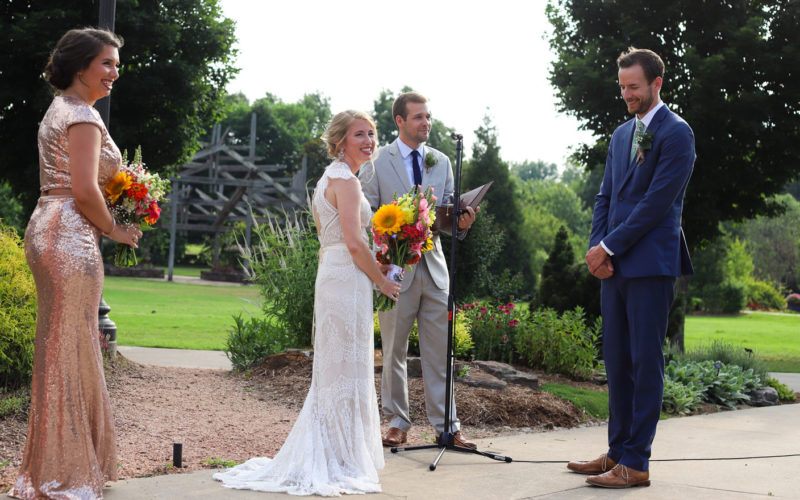Couple seeks to erase wedding’s carbon footprint
ANDREA JOHNSON
ajohnson@nwadg.com
If provided the local resources, Fayetteville resident Stephanie Hackmann would have worn a dress fashioned out of recycled paper to her wedding. Instead she wore a secondhand dress she found online — one choice of many that would help her and her fiance achieve an earth-friendly wedding.
“If you’re only going to wear the dress once and it’s in great condition, to me it doesn’t matter if it’s already been worn once before. And it saved money,” Stephanie says. “That way I knew a new dress wasn’t being made on behalf of me.”

The Free Weekly/ANDREA JOHNSON
Stephanie and John Hackmann leave their wedding ceremony June 2 at the Botanical Garden of the Ozarks in Fayetteville in front of nearly 200 guests. The couple hope their wedding will inspire others to think about the impact events have on the environment,
Stephanie and her husband John Hackmann on June 2 became the first couple to attempt a zero-impact wedding at the Botanical Garden of the Ozarks in Fayetteville, says Liz Atwell, communications coordinator for the garden. The two oriented their plans around the goal to divert all onsite waste from landfills and offset their wedding’s carbon footprint.

The Free Weekly/ANDREA JOHNSON
Flowers made of recycled paper serve as table centerpieces at the Hackmann’s wedding. Stephanie and the bridesmaids picked their bouquets that morning at the Fayetteville Farmers’ Market.
Stephanie and John invited approximately 200 guests using virtual save-the-dates and invitations on biodegradable seed paper with recyclable envelopes, allowing guests to plant their invitations rather than throw them away. Stephanie assembled decorations from thrift stores and crafted flowers out of recycled paper for table centerpieces. On her wedding day, Stephanie and her bridesmaids picked out their flower bouquets from the Fayetteville Farmers Market.
Local vendors — such as The Farmer’s Table Cafe — helped them accomplish their goals, John says. The Farmer’s Table Cafe catered the event and agreed to donate leftover food to a local food bank, Stephanie says.
“All the vendors we ended up picking are people that already care about this kind of stuff as well and were just as excited about it as we are,” Stephanie says.
Stephanie and John enlisted their friend Tom Rohr and his local business, Food Loops, to ensure food waste didn’t end up in a landfill. Food Loops, created in November 2017, provided Eco-Products compostable utensils, plates and cups.
Food waste at events is often contaminated with paper and plastic, making it difficult to recover, Rohr says. Compostable dishes allowed them to salvage food waste and then use it to create fertilizer to sell back into the local market.
“Our tagline is ‘Nothing Wasted.’ I think they live their lives that way,” Rohr says.
Stephanie and John’s story began as “just a Walmart office romance,” Stephanie says.
The two became friends while working at Walmart’s home office in Bentonville, where John wooed Stephanie with his corny sense of humor, she says. Stephanie fondly remembers him teasing her about the reusable bamboo utensils she brought to lunch.
John grew up in a home where little went to waste, so Stephanie’s sustainable outlook caught his attention, he says.
“She really has an empathy and care for others, and I think that translates into her love for sustainability as well,” John says. “She really cares for people, animals, the environment and everything like that.”

The Free Weekly/ANDREA JOHNSON
Cookies at John and Stephanie Hackmann’s wedding match their earth-friendly theme. Food left over from the reception was donated to a local food bank.
John proposed last June during a picnic in the park. Stephanie, who works with Walmart’s energy and sustainability teams, planned the wedding with hopes to balance sustainability and their personal wishes, she says.

The Free Weekly/ANDREA JOHNSON
Stephanie Garman and John Hackmann were married June 2 by Cole Bockenfeld at the Botanical Garden of the Ozarks in Fayetteville. Katie Garman (left) served the bride as maid of honor. The couple planned their wedding to be as earth-friendly as possible.
After factoring in the cost to book one of their favorite bands, Boom! Kinetic, they spent approximately $17,000, which is nearly half the national average cost of a wedding, according to The Knot’s 2017 survey. Stephanie thinks they saved money by opting for DIY decorations, a preowned dress and farmers market flowers, she says.
Stephanie used a calculator she found online to estimate the carbon footprint produced primarily by guests’ travel at 11.4 CO2e, or the carbon dioxide equivalent used. Stephanie and John plan to pay for a forestry project through carbonfund.org to offset this footprint, Stephanie says.
John hopes their wedding will inspire others to think about the impact events have on the environment, he says. Those who use the botanical garden’s venues must adhere to the garden’s recycling requirements and choose preapproved vendors, Atwell says, and John thinks this should be more common.
“People might not think about this option unless they’re presented it,” he says. “I’m really happy that we’re able to do this. And not only that, but hopefully we provide a template for other people to do it as well.”
Couples don’t often consider the environmental impact their weddings might have, Atwell says, so she appreciates Stephanie and John’s passion and aspiration to change that.










